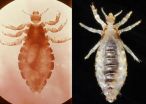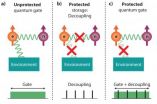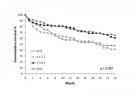(Press-News.org) CHAMPAIGN, Ill. — A new study offers compelling genetic evidence that head and body lice are the same species. The finding is of special interest because body lice can transmit deadly bacterial diseases, while head lice do not.
The study appears in the journal Insect Molecular Biology.
Scientists have long debated whether human head and body lice are the same or different species. The head louse (Pediculus humanus capitis) is a persistent nuisance, clinging to and laying its eggs in the hair, digging its mouthparts into the scalp and feeding on blood several times a day. The body louse (Pediculus humanus humanus) tends to be larger than its cranial counterpart, and is a more dangerous parasite. It lays its eggs on clothing, takes bigger blood meals, and can transmit relapsing fever, trench fever and epidemic typhus to its human host.
Previous studies have found that even when they are both present on the same host, head and body lice don't stray into each other's territories. They don't breed with one another in the wild, but they have been shown to successfully reproduce under specific laboratory conditions. The presence of head lice has little to do with human hygiene, but body lice seem to appear out of nowhere when hygiene suffers – in times of war or economic hardship, for example.
In the new study, researchers compared the number and sequences of all of the protein-coding genes expressed at every stage of the head and body louse life cycles.
"We were interested in understanding potentially how closely related head lice and body lice are," said University of Illinois entomology professor Barry Pittendrigh, who led the study. "Do they have the same number of genes? Do those genes look very similar or are they very different? What we found is that these two organisms are extremely similar in terms of their protein-coding genes."
The researchers also exposed the lice to a variety of environmental conditions to capture the greatest variety of gene activity.
"My colleagues at the University of Massachusetts, led by veterinary and animal sciences professor John Clark, collected lice at every developmental stage, exposed them to every pesticide they could get their hands on, multiple bacterial challenges, several physical challenges – cold, heat – to get the lice to express as many genes as possible," Pittendrigh said. Very few differences were detected in the number or sequences of genes they expressed.
"The differences in their sequences were so minor that if we didn't know they were separate groups, we would have considered them the same species," he said.
"As body lice transmit diseases and head lice don't, this system provides a unique opportunity to understand subtle changes that allow body lice to transmit human diseases," said graduate student Brett Olds, who conducted the genetic analysis.
INFORMATION:
The study team also included Illinois animal biology professor Kenneth Paige; entomology graduate students Laura Steele and Tolulope Agunbiade; and S.H. Lee, from the department of agricultural biotechnology at Seoul National University. The National Institute of Allergy and Infectious Diseases at the National Institutes of Health supported this research.
Editor's notes:
To reach Barry Pittendrigh, email pittendr@illinois.edu.
The paper, "Comparison of the transcriptional profiles of head and body lice," is available online.
Head and body lice appear to be the same species, genetic study finds
2012-04-10
ELSE PRESS RELEASES FROM THIS DATE:
A bit touchy: Plants' insect defenses activated by touch
2012-04-10
HOUSTON -- (April 9, 2012) -- A new study by Rice University scientists reveals that plants can use the sense of touch to fight off fungal infections and insects. The study, which will be published in the April 24 issue of Current Biology, finds that plant defenses are enhanced when plants are touched.
"From previous studies, we knew that plants change their growth in response to touch but we didn't know how these growth changes were activated," said Wassim Chehab, a faculty fellow in Rice's Department of Biochemistry and Cell Biology and lead author of the new study. ...
Opening the gate to robust quantum computing
2012-04-10
AMES, Iowa -- Scientists have overcome a major hurdle facing quantum computing: how to protect quantum information from degradation by the environment while simultaneously performing computation in a solid-state quantum system. The research was reported in the April 5 issue of Nature.
A group led by U.S. Department of Energy's Ames Laboratory physicist Viatsheslav Dobrovitski and including scientists at Delft University of Technology; the University of California, Santa Barbara; and University of Southern California, made this big step forward on the path to using the ...
O'Reilly Collins Wins $4.6 Million Verdict in Insurance Bad Faith Case
2012-04-10
On March 28, 2012, O'Reilly Collins obtained a verdict in favor of its client, Stephens & Stephens XII, LLC, and against Fireman's Fund Insurance Company for $4,673,125.10 for failure to pay an insurance claim.
Stephens' warehouse was stripped of copper wiring, causing over $2 million electrical and mechanical damages. Stephens was notified of the theft on July 1, 2007 by the Richmond police who apprehended two thieves. Stephens promptly notified its insurance company, Fireman's Fund, of the loss and asked to pay for the repairs. Fireman's Fund initially promised ...
Life expectancy may affect when you get married, divorced, have kids: Queen's University study
2012-04-10
Major life decisions such as marriage, divorce, abortion, having a child and attending university may be subconsciously influenced by how long people believe they will live, according to a Queen's University study.
"Life expectancy might be driving all of these major decisions," says Daniel Krupp, a post doctoral fellow in the Queen's math department who has a background in psychology and biology.
The longer someone expects to live, the more time they will invest in education. If life expectancy is short, someone may decide to get married and have children sooner, or ...
Caution needed when curbing overuse of healthcare resources, study suggests
2012-04-10
NEW YORK, April 9, 2012 – In the current hyper-charged United States healthcare debate, the focus on lowering cost without compromising quality of care remains a priority. But according to a new study by researchers at NYU Langone Medical Center and colleagues, one common approach may have serious unintended consequences.
Funded by the Robert Wood Johnson Foundation's (RWJF) Clinical Scholars program and the United States Department of Veterans Affairs (VA), the study, which appears today in the April issue of Health Affairs, examines the potential impact of policies ...
Heart failure patients with diabetes may benefit from higher glucose levels
2012-04-10
Lowering glucose levels for people with diabetes is normally critical to improving health outcomes. But for those with heart failure, that might not always be the case, say UCLA researchers.
A new study found that for advanced heart failure patients with diabetes, having higher blood glucose levels may actually help improve survival rates.
Currently published online in the American Journal of Cardiology, UCLA researchers compared levels of a marker used to track glucose levels called glycosylated hemoglobin in advanced heart failure patients with and without diabetes. ...
New Jersey Attorney Hanan M. Isaacs Featured Speaker for West LegalEdcenter CLE: E-Discovery and Evidence in the Era of Social Media
2012-04-10
Techniques for leveraging e-discovery and social media evidence. The West LegalEdcenter webinar will include discussions on the importance of e-discovery and social media evidence and how to use it as leverage in civil and criminal litigation. Mr. Isaacs, a New Jersey attorney, mediator, and arbitrator, will provide techniques for obtaining e-discovery and uses for social media. He will also cover material on the recent privacy invasion and bullying issues that resulted in the Rutgers University student's criminal trial and guilty verdicts.
Hanan M. lsaacs, M.A., J.D., ...
Job injuries among youth prompt calls for better safety standards
2012-04-10
AURORA, Colo. (April 9, 2012) – Dozens of American youth under the age of 20 die on the job each year while thousands more are injured, often due to poorly regulated work environments, according to a new report released by the Colorado School of Public Health.
"We don't tend to think of child labor as a major issue in the U.S. but we should," said the study's lead author Carol Runyan, Ph.D., MPH, and professor of epidemiology at the Colorado School of Public Health. "Laws governing the employment of youth ages 14 to 17 in this country are often very lenient and in the ...
TravelShark(TM) Honors 30 Unique Travel Discoveries with New Breed of Travel Award
2012-04-10
TravelShark today unveiled the first 30 winners of the Sharky Awards, a hyper-local awards program designed to recognize the freshest, most inspiring travel experiences across the globe.
The first group of winners is divided into three categories: People, Places, and Things. TravelShark launched the Sharky Awards in late 2011 and named this class of honorees as its first quarterly collection of rare discoveries and unique finds that make memorable additions to people's travel itineraries.
TravelShark singled out the water slide at Golden Nugget Las Vegas for top ...
Loss of predators in Northern Hemisphere affecting ecosystem health
2012-04-10
CORVALLIS, Ore. – A survey done on the loss in the Northern Hemisphere of large predators, particularly wolves, concludes that current populations of moose, deer, and other large herbivores far exceed their historic levels and are contributing to disrupted ecosystems.
The research, published today by scientists from Oregon State University, examined 42 studies done over the past 50 years.
It found that the loss of major predators in forest ecosystems has allowed game animal populations to greatly increase, crippling the growth of young trees and reducing biodiversity. ...




